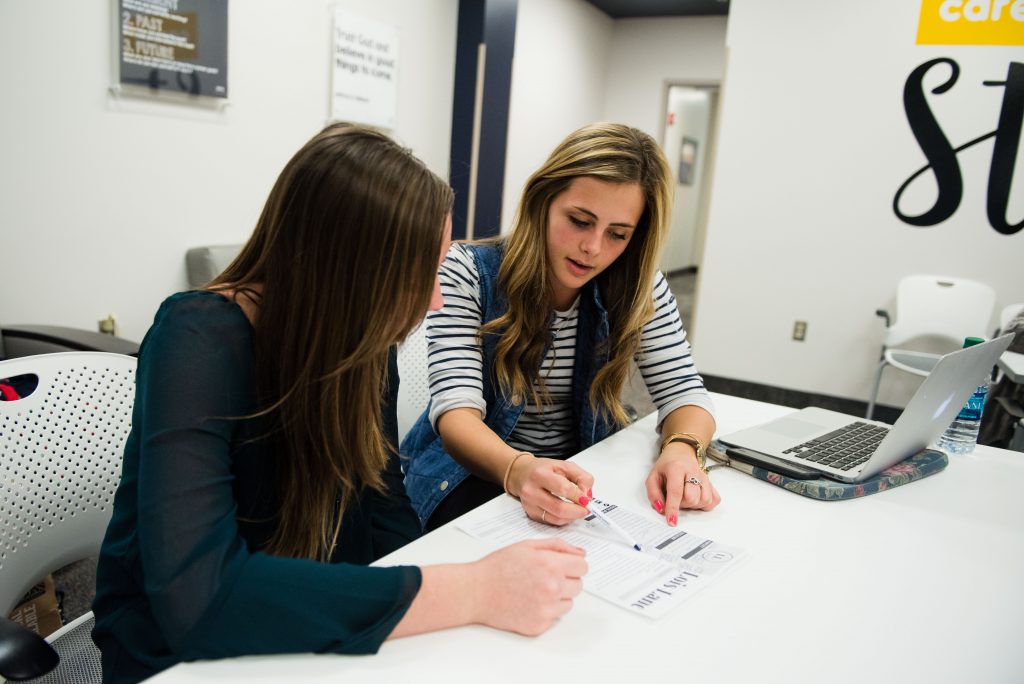
Writing resumes can be tricky, especially for college students who may not yet have much work experience.
Candilyn Newell, BYU career director of Life Sciences and an etiquette professor, said the main purpose of a resume is to introduce oneself to professionals in an intriguing way.
“The resume gets you the interview; the interview gets you the job,” she said. “Most resumes are read in less than 10 seconds, so what comes across is a representation of you — it’s ultimately your resume, and you do want to stand out.”
Newell emphasized the plethora of resources BYU offers students, specifically the Career Services Studio in the Wilkinson Student Center, which offers online resources — including resume templates — and personalized help for students seeking to perfect their resumes.
“I don’t think most students understand what incredible resources we have at BYU,” she said.
BYU economics student Ryan Tietjen is a student mentor at the Career Services studio. Tietjen and other student mentors help students with resumes, cover letters, LinkedIn profiles, mock interviews and other career-related services.
Both Newell and Tietjen shared tips for creating a successful resume.
Remember the purpose of the resume
“A resume connects us with big companies,” Tietjen said. “It shows who we are on a piece of paper.”
Newell said a resume is a company’s first impression of a prospective employee and should portray one’s life experiences.
“Speak about the experiences that you’ve earned. Celebrate your successes. Acknowledge your weaknesses and that you’re still becoming. Absolutely honor the life you’ve lived in your resume. That’s why it’s this wonderful living document that becomes a representation of you — it’s a company’s first look at who you are,” she said.
Some people may feel uncomfortable talking about themselves and their accomplishments on paper. Newell defined this as a “false dynamic of pride.”
“We have been given gifts and talents,” she said. “If we cannot acknowledge them with grace, understanding where they came from, I think is really tragic that we’ve fallen into a false pride trap.”
Create a master resume
Newell encourages her students to have a “master resume,” which becomes “like a journal of your life in bullet point format.” Though resumes should typically be a single page, Newell explained a master resume could be a page and a half or more, as it can continuously be added to as one gains more experience.
When it’s time to apply for a specific job, just copy and paste the master resume into a new document and delete the points that are irrelevant for said job, Newell said.
“It’s this wonderful document that is living because you’re acquiring experience and it translates into your resume,” she said. “It’s important because it helps you remember where you came from and it helps you articulate where you want to go.”
Target the resume for a specific job
Newell suggested researching a job’s mission statement and description, then pulling language out of both to put into the resume.
“So maybe the mission statement is, ‘We empower people to live better lives,’ so somewhere in your resume, you put the word ’empower.’ You’re going to replace the word you already have in your master resume and use ’empower,’ because it creates an alignment — you fit with their company. You fit with that position, and you only have to use three or five words (to turn it into) a very specific, very targeted resume,” she said.
Have clear formatting
Newell suggested students should meet with student mentors, like Tietjen, who can help edit and format a resume correctly. Something as small as a typo can eliminate a resume immediately, according to Newell.
Newell said resumes should be “easy to navigate.” She said bullet points on a resume should be like headlines for the interview — nicely organized and divided into sections.
“87% of employers prefer that the sections on the resume are divided by lines,”
she said.
Though a resume’s formating is important for clarity, Newell said some students have the misconception that formatting is the most important part. Rather, it’s the way one talks about their experiences that makes their resume unique, according to Newell.
“We’re all gaining experience and we just have to be able to talk about it professionally,” she said.
Newell suggested that students dive deeper into the results of their work experiences in order to help them stand out.
“A resume can’t merely be a job description,” she said. “Employers want to know where things happened and when things happened.”
Tietjen said experience is the main component of a resume.
“Experience is key,” Tietjen said. “(Experience) shows that you’re competent and can contribute in the industry. There’s no such thing as irrelevant experience.”
Newell said along with education, professional experience — which can include both paid and unpaid work, volunteer work, and skills, students should also include a section on their resume for interests.
She gave examples such as “I enjoy baking desserts, I’m a Star Wars expert, I love board games.”
“There are two things that happen in the interest section,” she said. “First of all, (the interviewers are) moving through here and they see you have all the skills, then they get to the interest section and they say, ‘Oh, a human being we’d actually like to work with’ and secondly, ‘they have outside interests, which will allow them not to burn out in this position.'”
Newell noted the interest section of a resume becomes extremely valuable because “It becomes that really fun, humanizing, wonderful section of you.”
So next time you need to update your resume, Newell suggests going over to the BYU Career Services to get personalized help. And don’t forget to ring the “victory bell” at the studio once you land your job.




